Corporate Culture Analysis Report: Samsung, Woolworths, Nestle, Tata
VerifiedAdded on 2020/12/10
|15
|4295
|155
Report
AI Summary
This report provides an in-depth analysis of the corporate cultures of Samsung, Woolworths, Nestle, and Tata. It explores the unique dimensions of each company's culture, including Samsung's seniority-oriented approach, Woolworths' emphasis on strong employee engagement, Nestle's people-focused structure, and Tata's ethical foundation. The report examines how these cultures impact employee behavior, decision-making, and overall organizational success. It discusses leadership styles, employee motivation, and the influence of cultural factors on business outcomes, highlighting the importance of adapting corporate culture to achieve strategic goals and maintain a competitive edge. The report also delves into the tangible and intangible components that shape each organization's environment, including the role of innovation, collaboration, and ethical considerations.
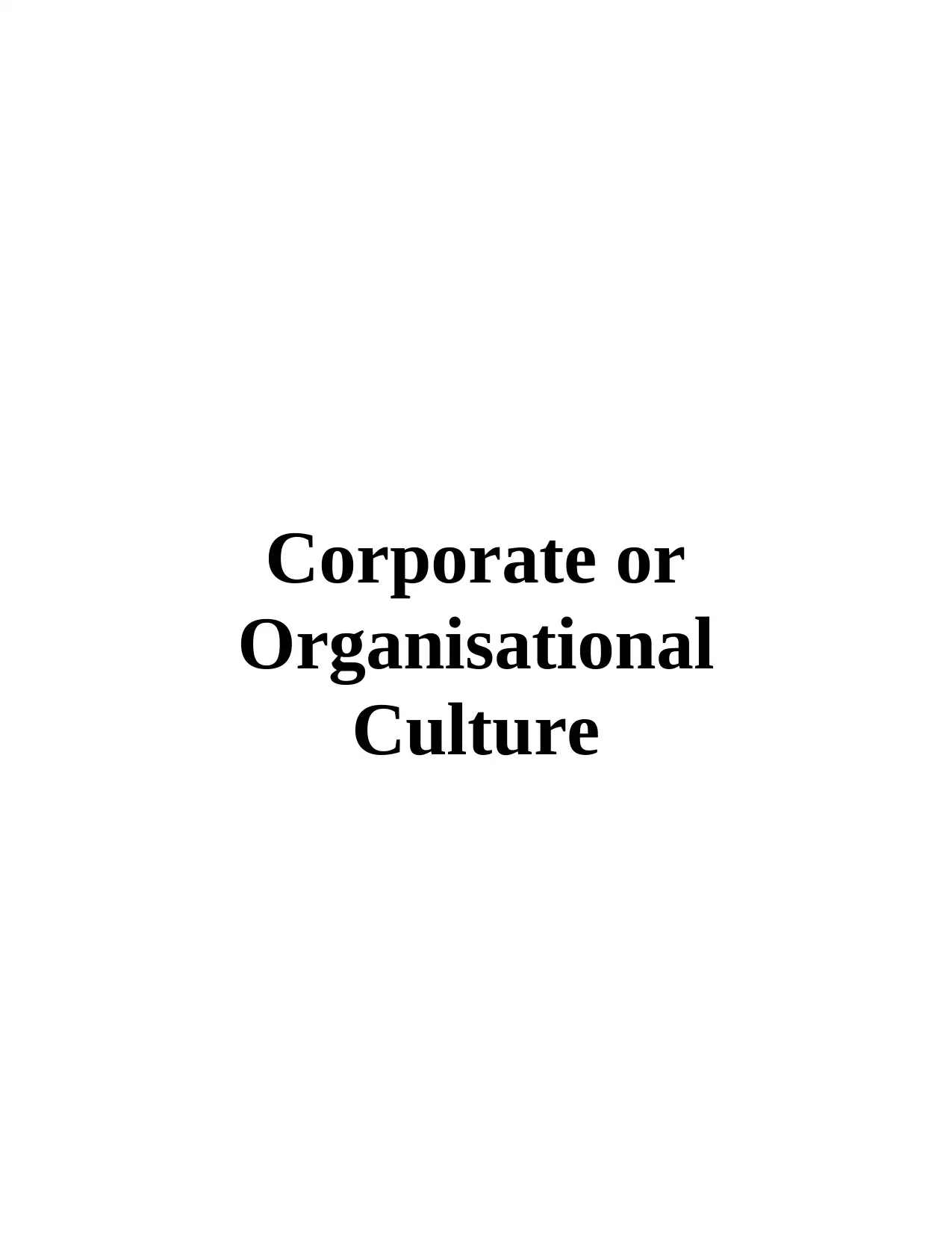
Corporate or
Organisational
Culture
Organisational
Culture
Paraphrase This Document
Need a fresh take? Get an instant paraphrase of this document with our AI Paraphraser
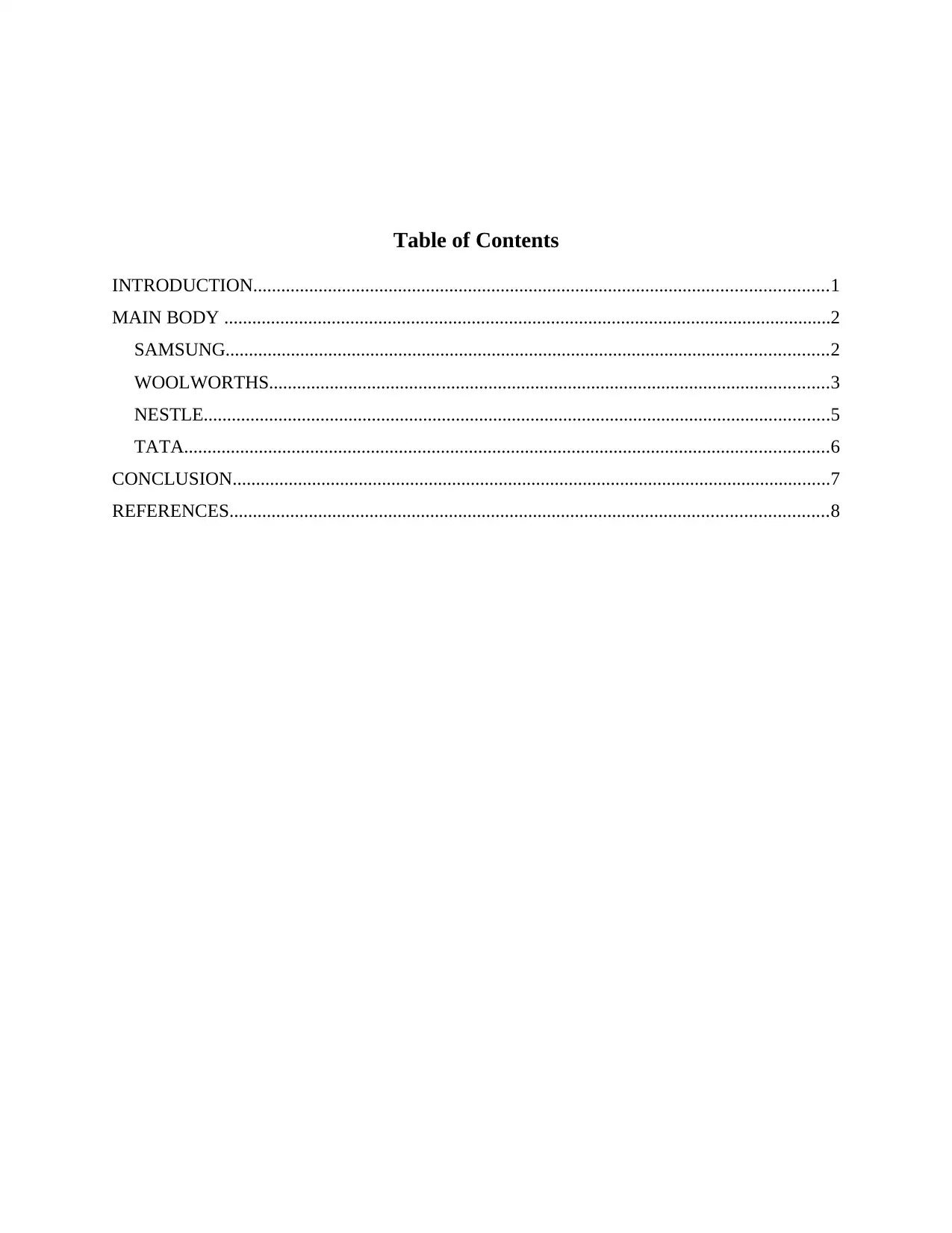
Table of Contents
INTRODUCTION...........................................................................................................................1
MAIN BODY ..................................................................................................................................2
SAMSUNG.................................................................................................................................2
WOOLWORTHS........................................................................................................................3
NESTLE......................................................................................................................................5
TATA..........................................................................................................................................6
CONCLUSION................................................................................................................................7
REFERENCES................................................................................................................................8
INTRODUCTION...........................................................................................................................1
MAIN BODY ..................................................................................................................................2
SAMSUNG.................................................................................................................................2
WOOLWORTHS........................................................................................................................3
NESTLE......................................................................................................................................5
TATA..........................................................................................................................................6
CONCLUSION................................................................................................................................7
REFERENCES................................................................................................................................8

⊘ This is a preview!⊘
Do you want full access?
Subscribe today to unlock all pages.

Trusted by 1+ million students worldwide
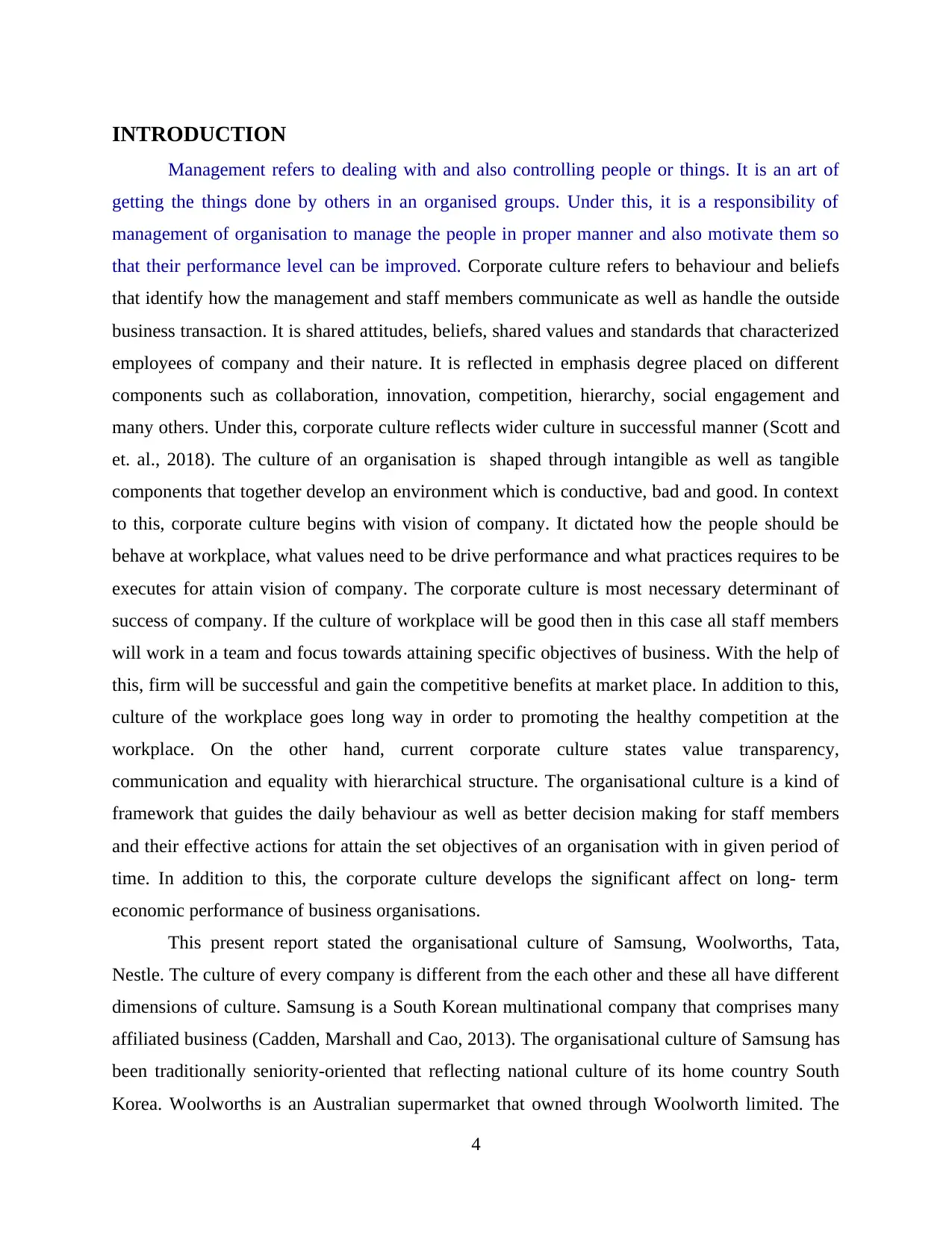
INTRODUCTION
Management refers to dealing with and also controlling people or things. It is an art of
getting the things done by others in an organised groups. Under this, it is a responsibility of
management of organisation to manage the people in proper manner and also motivate them so
that their performance level can be improved. Corporate culture refers to behaviour and beliefs
that identify how the management and staff members communicate as well as handle the outside
business transaction. It is shared attitudes, beliefs, shared values and standards that characterized
employees of company and their nature. It is reflected in emphasis degree placed on different
components such as collaboration, innovation, competition, hierarchy, social engagement and
many others. Under this, corporate culture reflects wider culture in successful manner (Scott and
et. al., 2018). The culture of an organisation is shaped through intangible as well as tangible
components that together develop an environment which is conductive, bad and good. In context
to this, corporate culture begins with vision of company. It dictated how the people should be
behave at workplace, what values need to be drive performance and what practices requires to be
executes for attain vision of company. The corporate culture is most necessary determinant of
success of company. If the culture of workplace will be good then in this case all staff members
will work in a team and focus towards attaining specific objectives of business. With the help of
this, firm will be successful and gain the competitive benefits at market place. In addition to this,
culture of the workplace goes long way in order to promoting the healthy competition at the
workplace. On the other hand, current corporate culture states value transparency,
communication and equality with hierarchical structure. The organisational culture is a kind of
framework that guides the daily behaviour as well as better decision making for staff members
and their effective actions for attain the set objectives of an organisation with in given period of
time. In addition to this, the corporate culture develops the significant affect on long- term
economic performance of business organisations.
This present report stated the organisational culture of Samsung, Woolworths, Tata,
Nestle. The culture of every company is different from the each other and these all have different
dimensions of culture. Samsung is a South Korean multinational company that comprises many
affiliated business (Cadden, Marshall and Cao, 2013). The organisational culture of Samsung has
been traditionally seniority-oriented that reflecting national culture of its home country South
Korea. Woolworths is an Australian supermarket that owned through Woolworth limited. The
4
Management refers to dealing with and also controlling people or things. It is an art of
getting the things done by others in an organised groups. Under this, it is a responsibility of
management of organisation to manage the people in proper manner and also motivate them so
that their performance level can be improved. Corporate culture refers to behaviour and beliefs
that identify how the management and staff members communicate as well as handle the outside
business transaction. It is shared attitudes, beliefs, shared values and standards that characterized
employees of company and their nature. It is reflected in emphasis degree placed on different
components such as collaboration, innovation, competition, hierarchy, social engagement and
many others. Under this, corporate culture reflects wider culture in successful manner (Scott and
et. al., 2018). The culture of an organisation is shaped through intangible as well as tangible
components that together develop an environment which is conductive, bad and good. In context
to this, corporate culture begins with vision of company. It dictated how the people should be
behave at workplace, what values need to be drive performance and what practices requires to be
executes for attain vision of company. The corporate culture is most necessary determinant of
success of company. If the culture of workplace will be good then in this case all staff members
will work in a team and focus towards attaining specific objectives of business. With the help of
this, firm will be successful and gain the competitive benefits at market place. In addition to this,
culture of the workplace goes long way in order to promoting the healthy competition at the
workplace. On the other hand, current corporate culture states value transparency,
communication and equality with hierarchical structure. The organisational culture is a kind of
framework that guides the daily behaviour as well as better decision making for staff members
and their effective actions for attain the set objectives of an organisation with in given period of
time. In addition to this, the corporate culture develops the significant affect on long- term
economic performance of business organisations.
This present report stated the organisational culture of Samsung, Woolworths, Tata,
Nestle. The culture of every company is different from the each other and these all have different
dimensions of culture. Samsung is a South Korean multinational company that comprises many
affiliated business (Cadden, Marshall and Cao, 2013). The organisational culture of Samsung has
been traditionally seniority-oriented that reflecting national culture of its home country South
Korea. Woolworths is an Australian supermarket that owned through Woolworth limited. The
4
Paraphrase This Document
Need a fresh take? Get an instant paraphrase of this document with our AI Paraphraser
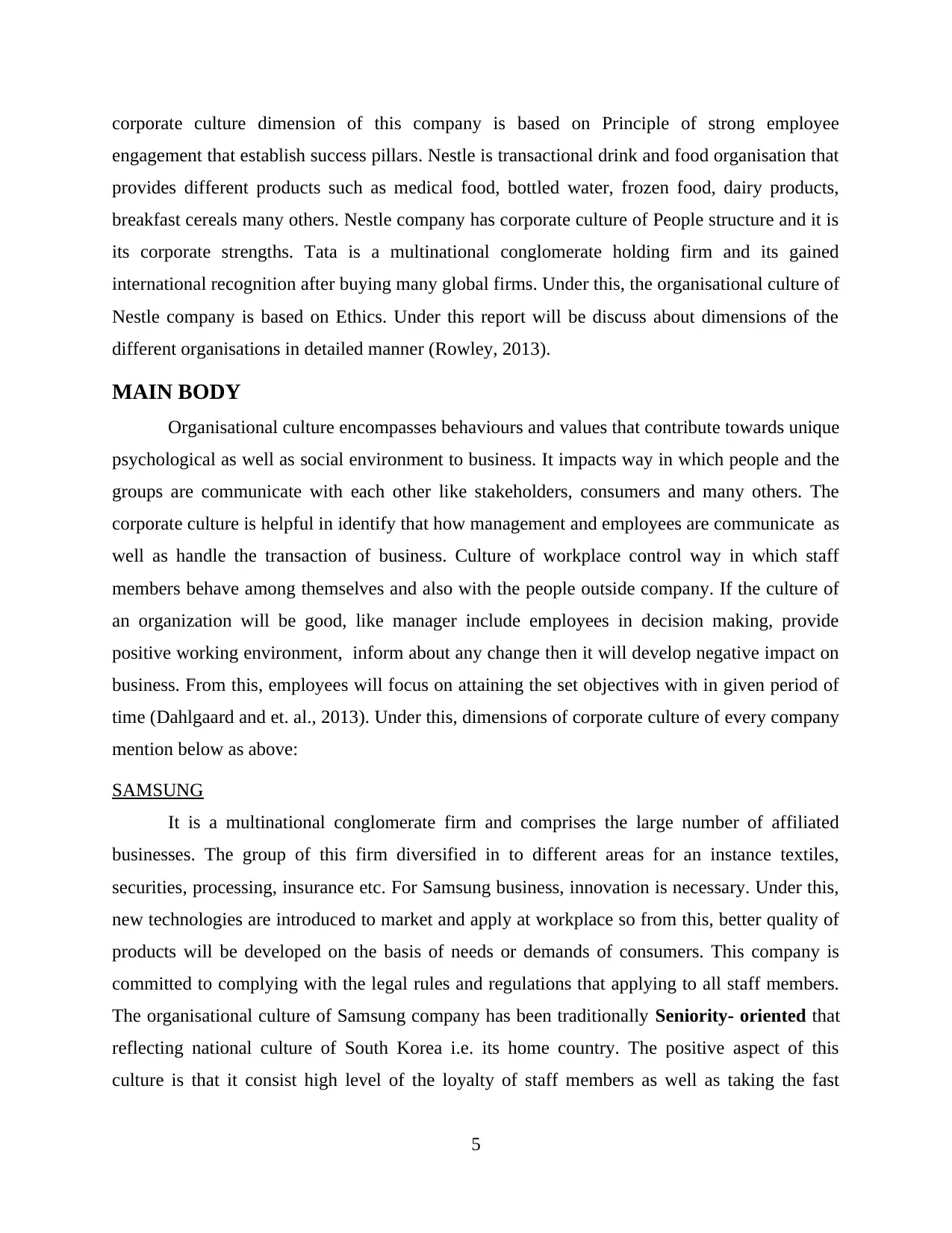
corporate culture dimension of this company is based on Principle of strong employee
engagement that establish success pillars. Nestle is transactional drink and food organisation that
provides different products such as medical food, bottled water, frozen food, dairy products,
breakfast cereals many others. Nestle company has corporate culture of People structure and it is
its corporate strengths. Tata is a multinational conglomerate holding firm and its gained
international recognition after buying many global firms. Under this, the organisational culture of
Nestle company is based on Ethics. Under this report will be discuss about dimensions of the
different organisations in detailed manner (Rowley, 2013).
MAIN BODY
Organisational culture encompasses behaviours and values that contribute towards unique
psychological as well as social environment to business. It impacts way in which people and the
groups are communicate with each other like stakeholders, consumers and many others. The
corporate culture is helpful in identify that how management and employees are communicate as
well as handle the transaction of business. Culture of workplace control way in which staff
members behave among themselves and also with the people outside company. If the culture of
an organization will be good, like manager include employees in decision making, provide
positive working environment, inform about any change then it will develop negative impact on
business. From this, employees will focus on attaining the set objectives with in given period of
time (Dahlgaard and et. al., 2013). Under this, dimensions of corporate culture of every company
mention below as above:
SAMSUNG
It is a multinational conglomerate firm and comprises the large number of affiliated
businesses. The group of this firm diversified in to different areas for an instance textiles,
securities, processing, insurance etc. For Samsung business, innovation is necessary. Under this,
new technologies are introduced to market and apply at workplace so from this, better quality of
products will be developed on the basis of needs or demands of consumers. This company is
committed to complying with the legal rules and regulations that applying to all staff members.
The organisational culture of Samsung company has been traditionally Seniority- oriented that
reflecting national culture of South Korea i.e. its home country. The positive aspect of this
culture is that it consist high level of the loyalty of staff members as well as taking the fast
5
engagement that establish success pillars. Nestle is transactional drink and food organisation that
provides different products such as medical food, bottled water, frozen food, dairy products,
breakfast cereals many others. Nestle company has corporate culture of People structure and it is
its corporate strengths. Tata is a multinational conglomerate holding firm and its gained
international recognition after buying many global firms. Under this, the organisational culture of
Nestle company is based on Ethics. Under this report will be discuss about dimensions of the
different organisations in detailed manner (Rowley, 2013).
MAIN BODY
Organisational culture encompasses behaviours and values that contribute towards unique
psychological as well as social environment to business. It impacts way in which people and the
groups are communicate with each other like stakeholders, consumers and many others. The
corporate culture is helpful in identify that how management and employees are communicate as
well as handle the transaction of business. Culture of workplace control way in which staff
members behave among themselves and also with the people outside company. If the culture of
an organization will be good, like manager include employees in decision making, provide
positive working environment, inform about any change then it will develop negative impact on
business. From this, employees will focus on attaining the set objectives with in given period of
time (Dahlgaard and et. al., 2013). Under this, dimensions of corporate culture of every company
mention below as above:
SAMSUNG
It is a multinational conglomerate firm and comprises the large number of affiliated
businesses. The group of this firm diversified in to different areas for an instance textiles,
securities, processing, insurance etc. For Samsung business, innovation is necessary. Under this,
new technologies are introduced to market and apply at workplace so from this, better quality of
products will be developed on the basis of needs or demands of consumers. This company is
committed to complying with the legal rules and regulations that applying to all staff members.
The organisational culture of Samsung company has been traditionally Seniority- oriented that
reflecting national culture of South Korea i.e. its home country. The positive aspect of this
culture is that it consist high level of the loyalty of staff members as well as taking the fast
5
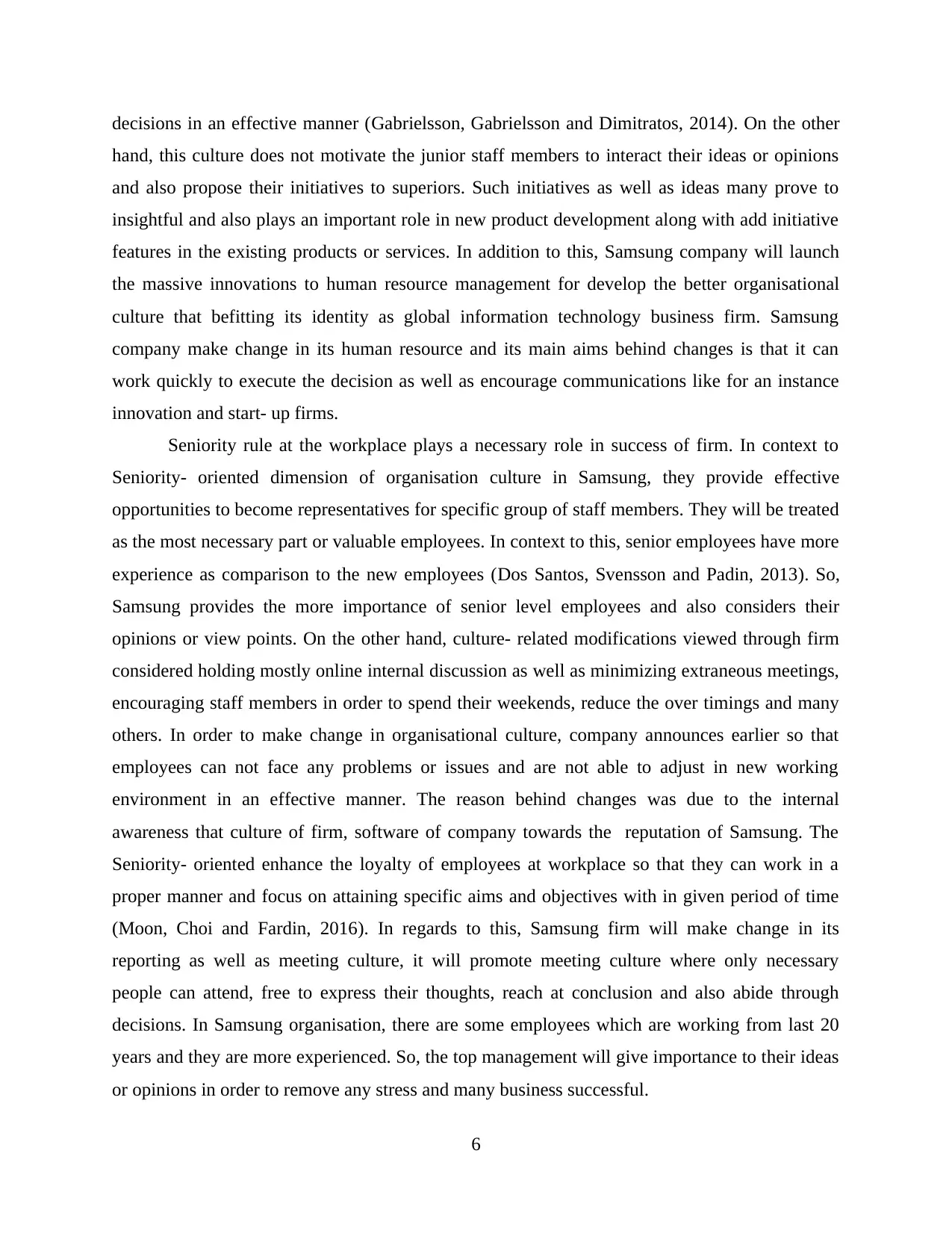
decisions in an effective manner (Gabrielsson, Gabrielsson and Dimitratos, 2014). On the other
hand, this culture does not motivate the junior staff members to interact their ideas or opinions
and also propose their initiatives to superiors. Such initiatives as well as ideas many prove to
insightful and also plays an important role in new product development along with add initiative
features in the existing products or services. In addition to this, Samsung company will launch
the massive innovations to human resource management for develop the better organisational
culture that befitting its identity as global information technology business firm. Samsung
company make change in its human resource and its main aims behind changes is that it can
work quickly to execute the decision as well as encourage communications like for an instance
innovation and start- up firms.
Seniority rule at the workplace plays a necessary role in success of firm. In context to
Seniority- oriented dimension of organisation culture in Samsung, they provide effective
opportunities to become representatives for specific group of staff members. They will be treated
as the most necessary part or valuable employees. In context to this, senior employees have more
experience as comparison to the new employees (Dos Santos, Svensson and Padin, 2013). So,
Samsung provides the more importance of senior level employees and also considers their
opinions or view points. On the other hand, culture- related modifications viewed through firm
considered holding mostly online internal discussion as well as minimizing extraneous meetings,
encouraging staff members in order to spend their weekends, reduce the over timings and many
others. In order to make change in organisational culture, company announces earlier so that
employees can not face any problems or issues and are not able to adjust in new working
environment in an effective manner. The reason behind changes was due to the internal
awareness that culture of firm, software of company towards the reputation of Samsung. The
Seniority- oriented enhance the loyalty of employees at workplace so that they can work in a
proper manner and focus on attaining specific aims and objectives with in given period of time
(Moon, Choi and Fardin, 2016). In regards to this, Samsung firm will make change in its
reporting as well as meeting culture, it will promote meeting culture where only necessary
people can attend, free to express their thoughts, reach at conclusion and also abide through
decisions. In Samsung organisation, there are some employees which are working from last 20
years and they are more experienced. So, the top management will give importance to their ideas
or opinions in order to remove any stress and many business successful.
6
hand, this culture does not motivate the junior staff members to interact their ideas or opinions
and also propose their initiatives to superiors. Such initiatives as well as ideas many prove to
insightful and also plays an important role in new product development along with add initiative
features in the existing products or services. In addition to this, Samsung company will launch
the massive innovations to human resource management for develop the better organisational
culture that befitting its identity as global information technology business firm. Samsung
company make change in its human resource and its main aims behind changes is that it can
work quickly to execute the decision as well as encourage communications like for an instance
innovation and start- up firms.
Seniority rule at the workplace plays a necessary role in success of firm. In context to
Seniority- oriented dimension of organisation culture in Samsung, they provide effective
opportunities to become representatives for specific group of staff members. They will be treated
as the most necessary part or valuable employees. In context to this, senior employees have more
experience as comparison to the new employees (Dos Santos, Svensson and Padin, 2013). So,
Samsung provides the more importance of senior level employees and also considers their
opinions or view points. On the other hand, culture- related modifications viewed through firm
considered holding mostly online internal discussion as well as minimizing extraneous meetings,
encouraging staff members in order to spend their weekends, reduce the over timings and many
others. In order to make change in organisational culture, company announces earlier so that
employees can not face any problems or issues and are not able to adjust in new working
environment in an effective manner. The reason behind changes was due to the internal
awareness that culture of firm, software of company towards the reputation of Samsung. The
Seniority- oriented enhance the loyalty of employees at workplace so that they can work in a
proper manner and focus on attaining specific aims and objectives with in given period of time
(Moon, Choi and Fardin, 2016). In regards to this, Samsung firm will make change in its
reporting as well as meeting culture, it will promote meeting culture where only necessary
people can attend, free to express their thoughts, reach at conclusion and also abide through
decisions. In Samsung organisation, there are some employees which are working from last 20
years and they are more experienced. So, the top management will give importance to their ideas
or opinions in order to remove any stress and many business successful.
6
⊘ This is a preview!⊘
Do you want full access?
Subscribe today to unlock all pages.

Trusted by 1+ million students worldwide
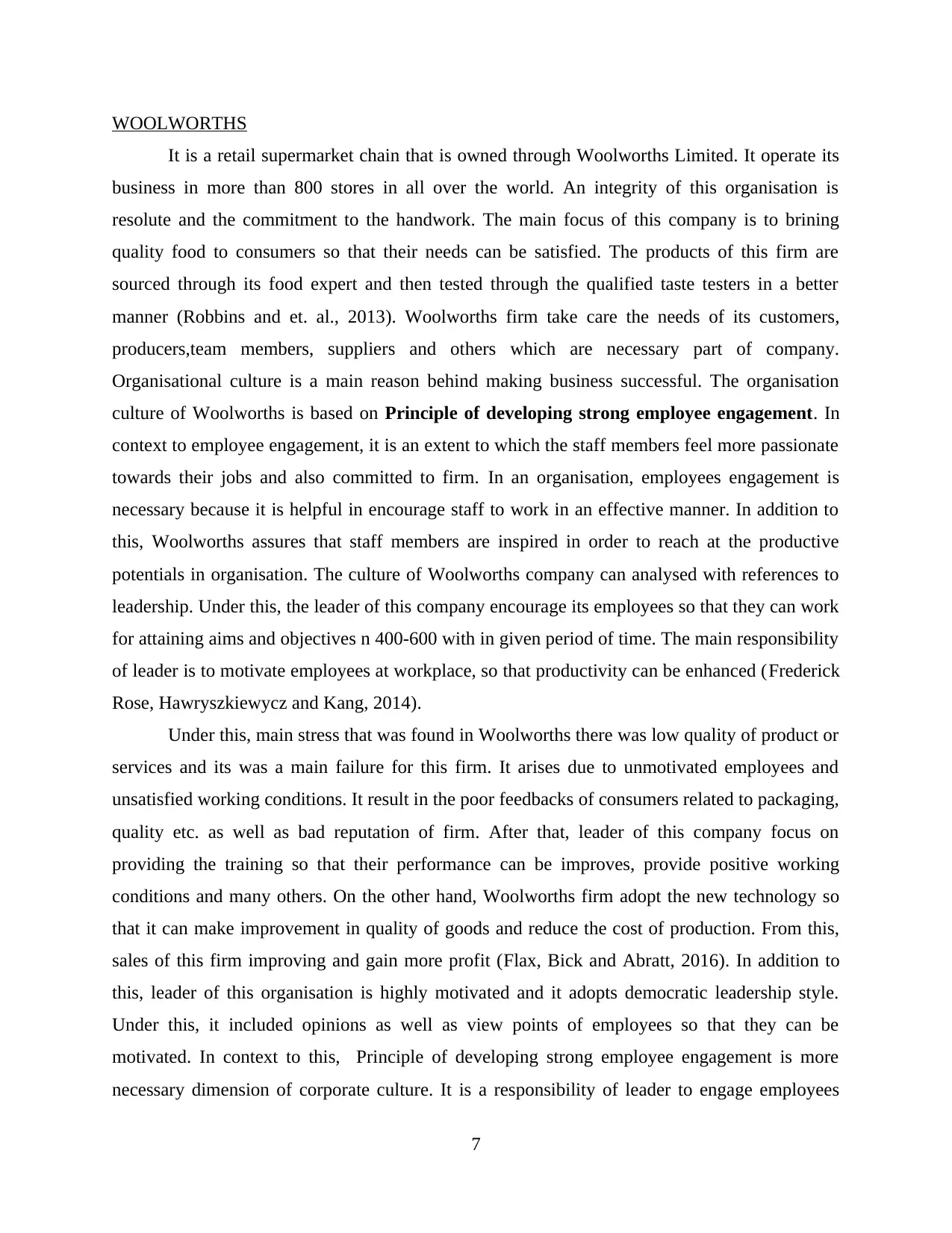
WOOLWORTHS
It is a retail supermarket chain that is owned through Woolworths Limited. It operate its
business in more than 800 stores in all over the world. An integrity of this organisation is
resolute and the commitment to the handwork. The main focus of this company is to brining
quality food to consumers so that their needs can be satisfied. The products of this firm are
sourced through its food expert and then tested through the qualified taste testers in a better
manner (Robbins and et. al., 2013). Woolworths firm take care the needs of its customers,
producers,team members, suppliers and others which are necessary part of company.
Organisational culture is a main reason behind making business successful. The organisation
culture of Woolworths is based on Principle of developing strong employee engagement. In
context to employee engagement, it is an extent to which the staff members feel more passionate
towards their jobs and also committed to firm. In an organisation, employees engagement is
necessary because it is helpful in encourage staff to work in an effective manner. In addition to
this, Woolworths assures that staff members are inspired in order to reach at the productive
potentials in organisation. The culture of Woolworths company can analysed with references to
leadership. Under this, the leader of this company encourage its employees so that they can work
for attaining aims and objectives n 400-600 with in given period of time. The main responsibility
of leader is to motivate employees at workplace, so that productivity can be enhanced (Frederick
Rose, Hawryszkiewycz and Kang, 2014).
Under this, main stress that was found in Woolworths there was low quality of product or
services and its was a main failure for this firm. It arises due to unmotivated employees and
unsatisfied working conditions. It result in the poor feedbacks of consumers related to packaging,
quality etc. as well as bad reputation of firm. After that, leader of this company focus on
providing the training so that their performance can be improves, provide positive working
conditions and many others. On the other hand, Woolworths firm adopt the new technology so
that it can make improvement in quality of goods and reduce the cost of production. From this,
sales of this firm improving and gain more profit (Flax, Bick and Abratt, 2016). In addition to
this, leader of this organisation is highly motivated and it adopts democratic leadership style.
Under this, it included opinions as well as view points of employees so that they can be
motivated. In context to this, Principle of developing strong employee engagement is more
necessary dimension of corporate culture. It is a responsibility of leader to engage employees
7
It is a retail supermarket chain that is owned through Woolworths Limited. It operate its
business in more than 800 stores in all over the world. An integrity of this organisation is
resolute and the commitment to the handwork. The main focus of this company is to brining
quality food to consumers so that their needs can be satisfied. The products of this firm are
sourced through its food expert and then tested through the qualified taste testers in a better
manner (Robbins and et. al., 2013). Woolworths firm take care the needs of its customers,
producers,team members, suppliers and others which are necessary part of company.
Organisational culture is a main reason behind making business successful. The organisation
culture of Woolworths is based on Principle of developing strong employee engagement. In
context to employee engagement, it is an extent to which the staff members feel more passionate
towards their jobs and also committed to firm. In an organisation, employees engagement is
necessary because it is helpful in encourage staff to work in an effective manner. In addition to
this, Woolworths assures that staff members are inspired in order to reach at the productive
potentials in organisation. The culture of Woolworths company can analysed with references to
leadership. Under this, the leader of this company encourage its employees so that they can work
for attaining aims and objectives n 400-600 with in given period of time. The main responsibility
of leader is to motivate employees at workplace, so that productivity can be enhanced (Frederick
Rose, Hawryszkiewycz and Kang, 2014).
Under this, main stress that was found in Woolworths there was low quality of product or
services and its was a main failure for this firm. It arises due to unmotivated employees and
unsatisfied working conditions. It result in the poor feedbacks of consumers related to packaging,
quality etc. as well as bad reputation of firm. After that, leader of this company focus on
providing the training so that their performance can be improves, provide positive working
conditions and many others. On the other hand, Woolworths firm adopt the new technology so
that it can make improvement in quality of goods and reduce the cost of production. From this,
sales of this firm improving and gain more profit (Flax, Bick and Abratt, 2016). In addition to
this, leader of this organisation is highly motivated and it adopts democratic leadership style.
Under this, it included opinions as well as view points of employees so that they can be
motivated. In context to this, Principle of developing strong employee engagement is more
necessary dimension of corporate culture. It is a responsibility of leader to engage employees
7
Paraphrase This Document
Need a fresh take? Get an instant paraphrase of this document with our AI Paraphraser
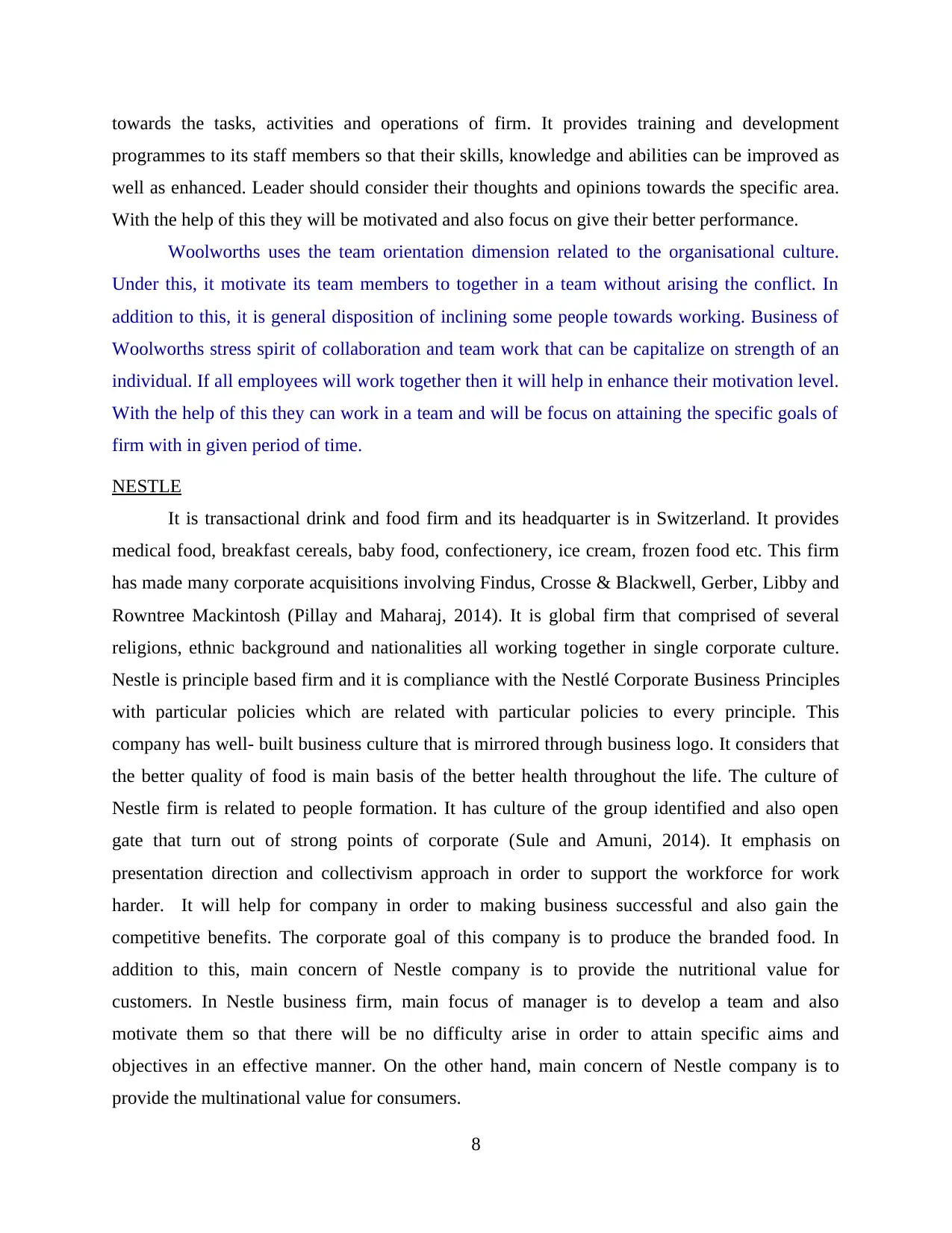
towards the tasks, activities and operations of firm. It provides training and development
programmes to its staff members so that their skills, knowledge and abilities can be improved as
well as enhanced. Leader should consider their thoughts and opinions towards the specific area.
With the help of this they will be motivated and also focus on give their better performance.
Woolworths uses the team orientation dimension related to the organisational culture.
Under this, it motivate its team members to together in a team without arising the conflict. In
addition to this, it is general disposition of inclining some people towards working. Business of
Woolworths stress spirit of collaboration and team work that can be capitalize on strength of an
individual. If all employees will work together then it will help in enhance their motivation level.
With the help of this they can work in a team and will be focus on attaining the specific goals of
firm with in given period of time.
NESTLE
It is transactional drink and food firm and its headquarter is in Switzerland. It provides
medical food, breakfast cereals, baby food, confectionery, ice cream, frozen food etc. This firm
has made many corporate acquisitions involving Findus, Crosse & Blackwell, Gerber, Libby and
Rowntree Mackintosh (Pillay and Maharaj, 2014). It is global firm that comprised of several
religions, ethnic background and nationalities all working together in single corporate culture.
Nestle is principle based firm and it is compliance with the Nestlé Corporate Business Principles
with particular policies which are related with particular policies to every principle. This
company has well- built business culture that is mirrored through business logo. It considers that
the better quality of food is main basis of the better health throughout the life. The culture of
Nestle firm is related to people formation. It has culture of the group identified and also open
gate that turn out of strong points of corporate (Sule and Amuni, 2014). It emphasis on
presentation direction and collectivism approach in order to support the workforce for work
harder. It will help for company in order to making business successful and also gain the
competitive benefits. The corporate goal of this company is to produce the branded food. In
addition to this, main concern of Nestle company is to provide the nutritional value for
customers. In Nestle business firm, main focus of manager is to develop a team and also
motivate them so that there will be no difficulty arise in order to attain specific aims and
objectives in an effective manner. On the other hand, main concern of Nestle company is to
provide the multinational value for consumers.
8
programmes to its staff members so that their skills, knowledge and abilities can be improved as
well as enhanced. Leader should consider their thoughts and opinions towards the specific area.
With the help of this they will be motivated and also focus on give their better performance.
Woolworths uses the team orientation dimension related to the organisational culture.
Under this, it motivate its team members to together in a team without arising the conflict. In
addition to this, it is general disposition of inclining some people towards working. Business of
Woolworths stress spirit of collaboration and team work that can be capitalize on strength of an
individual. If all employees will work together then it will help in enhance their motivation level.
With the help of this they can work in a team and will be focus on attaining the specific goals of
firm with in given period of time.
NESTLE
It is transactional drink and food firm and its headquarter is in Switzerland. It provides
medical food, breakfast cereals, baby food, confectionery, ice cream, frozen food etc. This firm
has made many corporate acquisitions involving Findus, Crosse & Blackwell, Gerber, Libby and
Rowntree Mackintosh (Pillay and Maharaj, 2014). It is global firm that comprised of several
religions, ethnic background and nationalities all working together in single corporate culture.
Nestle is principle based firm and it is compliance with the Nestlé Corporate Business Principles
with particular policies which are related with particular policies to every principle. This
company has well- built business culture that is mirrored through business logo. It considers that
the better quality of food is main basis of the better health throughout the life. The culture of
Nestle firm is related to people formation. It has culture of the group identified and also open
gate that turn out of strong points of corporate (Sule and Amuni, 2014). It emphasis on
presentation direction and collectivism approach in order to support the workforce for work
harder. It will help for company in order to making business successful and also gain the
competitive benefits. The corporate goal of this company is to produce the branded food. In
addition to this, main concern of Nestle company is to provide the nutritional value for
customers. In Nestle business firm, main focus of manager is to develop a team and also
motivate them so that there will be no difficulty arise in order to attain specific aims and
objectives in an effective manner. On the other hand, main concern of Nestle company is to
provide the multinational value for consumers.
8
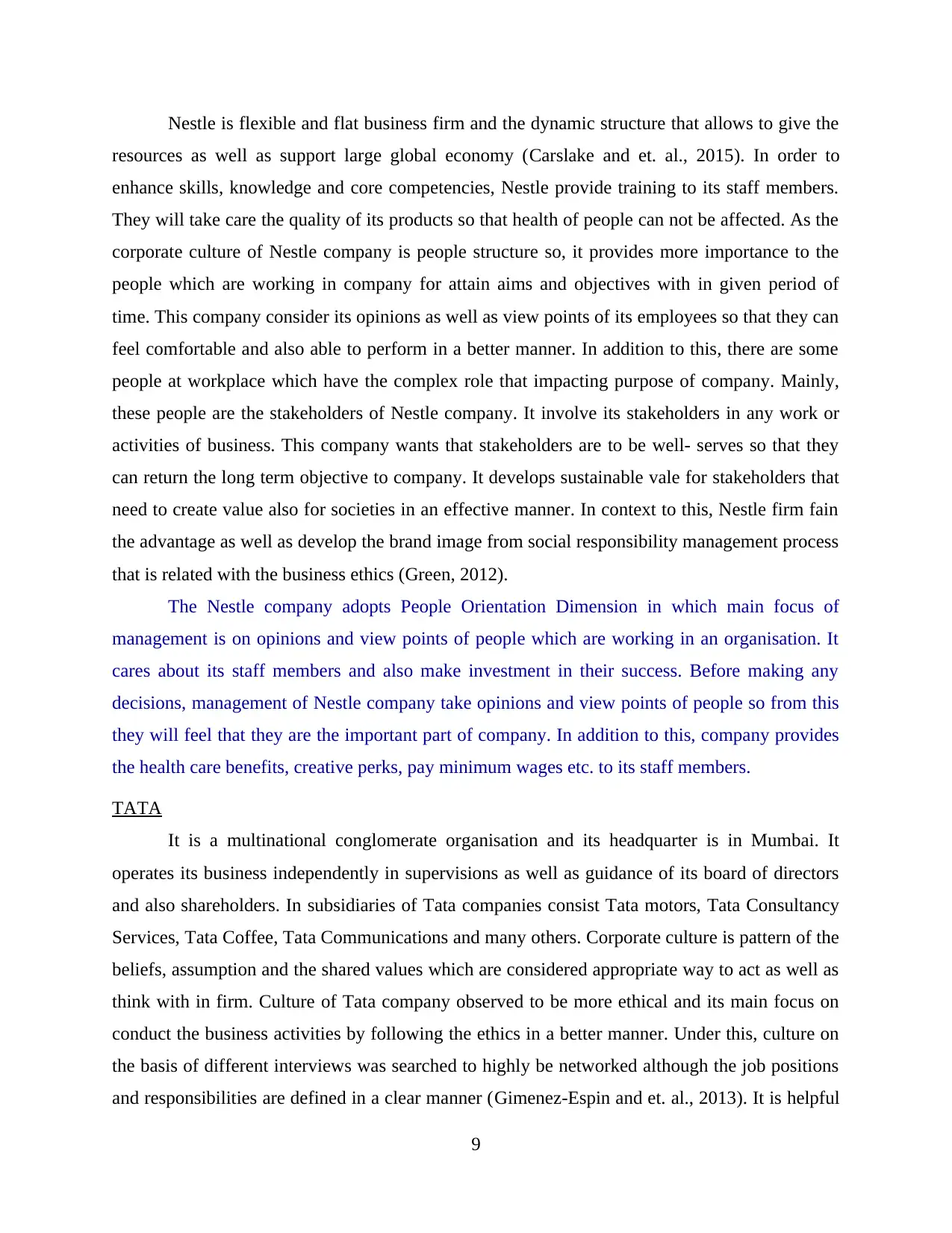
Nestle is flexible and flat business firm and the dynamic structure that allows to give the
resources as well as support large global economy (Carslake and et. al., 2015). In order to
enhance skills, knowledge and core competencies, Nestle provide training to its staff members.
They will take care the quality of its products so that health of people can not be affected. As the
corporate culture of Nestle company is people structure so, it provides more importance to the
people which are working in company for attain aims and objectives with in given period of
time. This company consider its opinions as well as view points of its employees so that they can
feel comfortable and also able to perform in a better manner. In addition to this, there are some
people at workplace which have the complex role that impacting purpose of company. Mainly,
these people are the stakeholders of Nestle company. It involve its stakeholders in any work or
activities of business. This company wants that stakeholders are to be well- serves so that they
can return the long term objective to company. It develops sustainable vale for stakeholders that
need to create value also for societies in an effective manner. In context to this, Nestle firm fain
the advantage as well as develop the brand image from social responsibility management process
that is related with the business ethics (Green, 2012).
The Nestle company adopts People Orientation Dimension in which main focus of
management is on opinions and view points of people which are working in an organisation. It
cares about its staff members and also make investment in their success. Before making any
decisions, management of Nestle company take opinions and view points of people so from this
they will feel that they are the important part of company. In addition to this, company provides
the health care benefits, creative perks, pay minimum wages etc. to its staff members.
TATA
It is a multinational conglomerate organisation and its headquarter is in Mumbai. It
operates its business independently in supervisions as well as guidance of its board of directors
and also shareholders. In subsidiaries of Tata companies consist Tata motors, Tata Consultancy
Services, Tata Coffee, Tata Communications and many others. Corporate culture is pattern of the
beliefs, assumption and the shared values which are considered appropriate way to act as well as
think with in firm. Culture of Tata company observed to be more ethical and its main focus on
conduct the business activities by following the ethics in a better manner. Under this, culture on
the basis of different interviews was searched to highly be networked although the job positions
and responsibilities are defined in a clear manner (Gimenez-Espin and et. al., 2013). It is helpful
9
resources as well as support large global economy (Carslake and et. al., 2015). In order to
enhance skills, knowledge and core competencies, Nestle provide training to its staff members.
They will take care the quality of its products so that health of people can not be affected. As the
corporate culture of Nestle company is people structure so, it provides more importance to the
people which are working in company for attain aims and objectives with in given period of
time. This company consider its opinions as well as view points of its employees so that they can
feel comfortable and also able to perform in a better manner. In addition to this, there are some
people at workplace which have the complex role that impacting purpose of company. Mainly,
these people are the stakeholders of Nestle company. It involve its stakeholders in any work or
activities of business. This company wants that stakeholders are to be well- serves so that they
can return the long term objective to company. It develops sustainable vale for stakeholders that
need to create value also for societies in an effective manner. In context to this, Nestle firm fain
the advantage as well as develop the brand image from social responsibility management process
that is related with the business ethics (Green, 2012).
The Nestle company adopts People Orientation Dimension in which main focus of
management is on opinions and view points of people which are working in an organisation. It
cares about its staff members and also make investment in their success. Before making any
decisions, management of Nestle company take opinions and view points of people so from this
they will feel that they are the important part of company. In addition to this, company provides
the health care benefits, creative perks, pay minimum wages etc. to its staff members.
TATA
It is a multinational conglomerate organisation and its headquarter is in Mumbai. It
operates its business independently in supervisions as well as guidance of its board of directors
and also shareholders. In subsidiaries of Tata companies consist Tata motors, Tata Consultancy
Services, Tata Coffee, Tata Communications and many others. Corporate culture is pattern of the
beliefs, assumption and the shared values which are considered appropriate way to act as well as
think with in firm. Culture of Tata company observed to be more ethical and its main focus on
conduct the business activities by following the ethics in a better manner. Under this, culture on
the basis of different interviews was searched to highly be networked although the job positions
and responsibilities are defined in a clear manner (Gimenez-Espin and et. al., 2013). It is helpful
9
⊘ This is a preview!⊘
Do you want full access?
Subscribe today to unlock all pages.

Trusted by 1+ million students worldwide
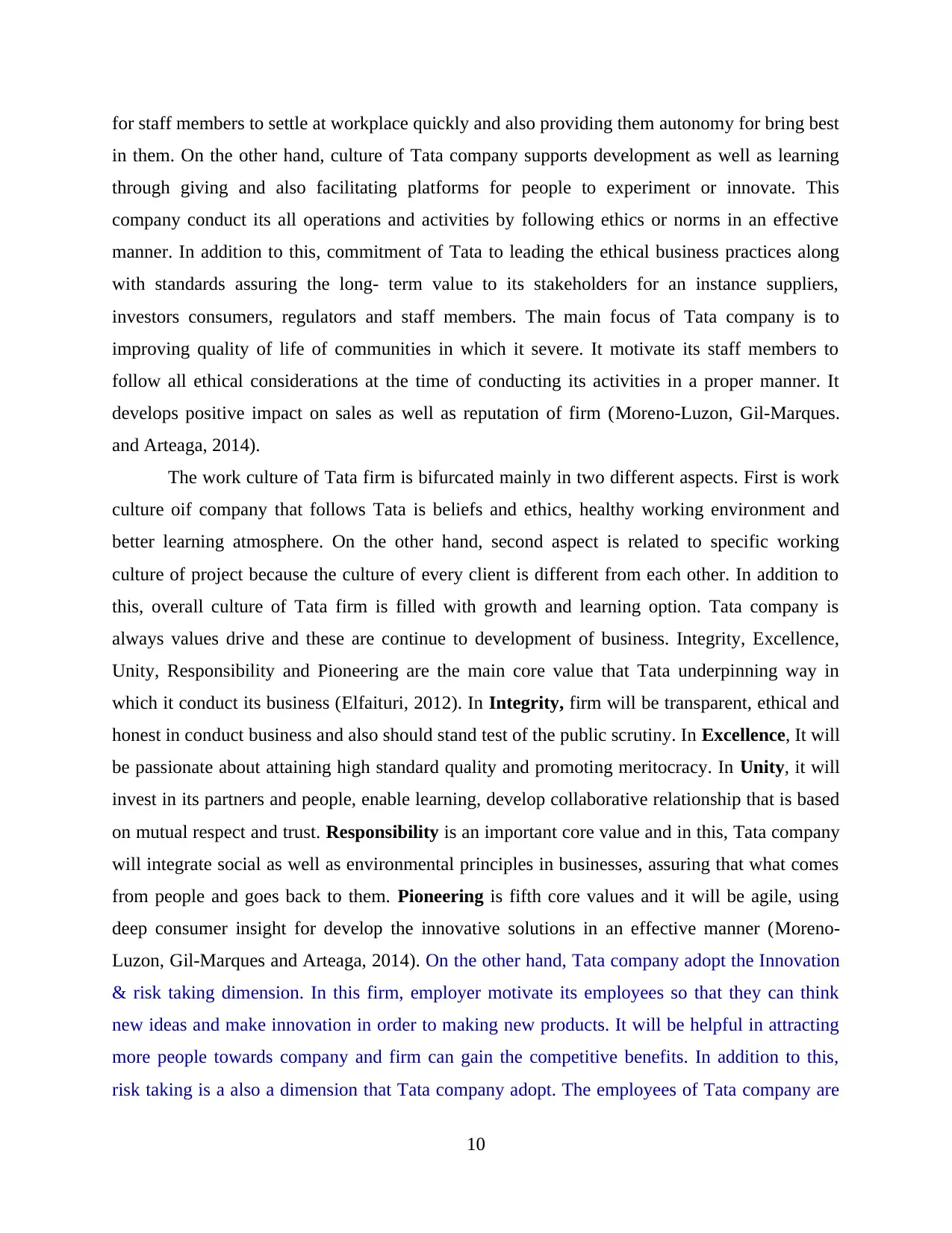
for staff members to settle at workplace quickly and also providing them autonomy for bring best
in them. On the other hand, culture of Tata company supports development as well as learning
through giving and also facilitating platforms for people to experiment or innovate. This
company conduct its all operations and activities by following ethics or norms in an effective
manner. In addition to this, commitment of Tata to leading the ethical business practices along
with standards assuring the long- term value to its stakeholders for an instance suppliers,
investors consumers, regulators and staff members. The main focus of Tata company is to
improving quality of life of communities in which it severe. It motivate its staff members to
follow all ethical considerations at the time of conducting its activities in a proper manner. It
develops positive impact on sales as well as reputation of firm (Moreno-Luzon, Gil-Marques.
and Arteaga, 2014).
The work culture of Tata firm is bifurcated mainly in two different aspects. First is work
culture oif company that follows Tata is beliefs and ethics, healthy working environment and
better learning atmosphere. On the other hand, second aspect is related to specific working
culture of project because the culture of every client is different from each other. In addition to
this, overall culture of Tata firm is filled with growth and learning option. Tata company is
always values drive and these are continue to development of business. Integrity, Excellence,
Unity, Responsibility and Pioneering are the main core value that Tata underpinning way in
which it conduct its business (Elfaituri, 2012). In Integrity, firm will be transparent, ethical and
honest in conduct business and also should stand test of the public scrutiny. In Excellence, It will
be passionate about attaining high standard quality and promoting meritocracy. In Unity, it will
invest in its partners and people, enable learning, develop collaborative relationship that is based
on mutual respect and trust. Responsibility is an important core value and in this, Tata company
will integrate social as well as environmental principles in businesses, assuring that what comes
from people and goes back to them. Pioneering is fifth core values and it will be agile, using
deep consumer insight for develop the innovative solutions in an effective manner (Moreno-
Luzon, Gil-Marques and Arteaga, 2014). On the other hand, Tata company adopt the Innovation
& risk taking dimension. In this firm, employer motivate its employees so that they can think
new ideas and make innovation in order to making new products. It will be helpful in attracting
more people towards company and firm can gain the competitive benefits. In addition to this,
risk taking is a also a dimension that Tata company adopt. The employees of Tata company are
10
in them. On the other hand, culture of Tata company supports development as well as learning
through giving and also facilitating platforms for people to experiment or innovate. This
company conduct its all operations and activities by following ethics or norms in an effective
manner. In addition to this, commitment of Tata to leading the ethical business practices along
with standards assuring the long- term value to its stakeholders for an instance suppliers,
investors consumers, regulators and staff members. The main focus of Tata company is to
improving quality of life of communities in which it severe. It motivate its staff members to
follow all ethical considerations at the time of conducting its activities in a proper manner. It
develops positive impact on sales as well as reputation of firm (Moreno-Luzon, Gil-Marques.
and Arteaga, 2014).
The work culture of Tata firm is bifurcated mainly in two different aspects. First is work
culture oif company that follows Tata is beliefs and ethics, healthy working environment and
better learning atmosphere. On the other hand, second aspect is related to specific working
culture of project because the culture of every client is different from each other. In addition to
this, overall culture of Tata firm is filled with growth and learning option. Tata company is
always values drive and these are continue to development of business. Integrity, Excellence,
Unity, Responsibility and Pioneering are the main core value that Tata underpinning way in
which it conduct its business (Elfaituri, 2012). In Integrity, firm will be transparent, ethical and
honest in conduct business and also should stand test of the public scrutiny. In Excellence, It will
be passionate about attaining high standard quality and promoting meritocracy. In Unity, it will
invest in its partners and people, enable learning, develop collaborative relationship that is based
on mutual respect and trust. Responsibility is an important core value and in this, Tata company
will integrate social as well as environmental principles in businesses, assuring that what comes
from people and goes back to them. Pioneering is fifth core values and it will be agile, using
deep consumer insight for develop the innovative solutions in an effective manner (Moreno-
Luzon, Gil-Marques and Arteaga, 2014). On the other hand, Tata company adopt the Innovation
& risk taking dimension. In this firm, employer motivate its employees so that they can think
new ideas and make innovation in order to making new products. It will be helpful in attracting
more people towards company and firm can gain the competitive benefits. In addition to this,
risk taking is a also a dimension that Tata company adopt. The employees of Tata company are
10
Paraphrase This Document
Need a fresh take? Get an instant paraphrase of this document with our AI Paraphraser
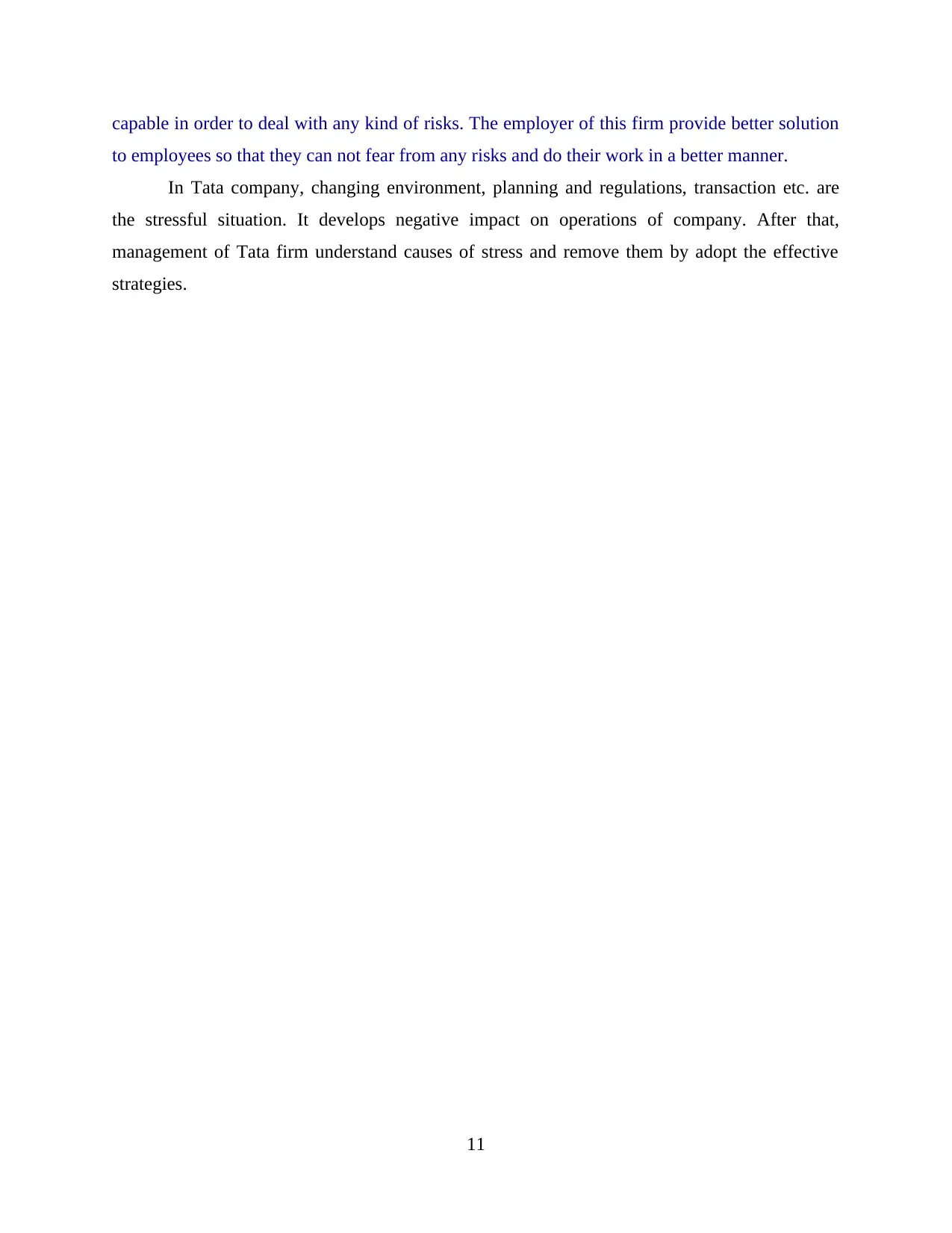
capable in order to deal with any kind of risks. The employer of this firm provide better solution
to employees so that they can not fear from any risks and do their work in a better manner.
In Tata company, changing environment, planning and regulations, transaction etc. are
the stressful situation. It develops negative impact on operations of company. After that,
management of Tata firm understand causes of stress and remove them by adopt the effective
strategies.
11
to employees so that they can not fear from any risks and do their work in a better manner.
In Tata company, changing environment, planning and regulations, transaction etc. are
the stressful situation. It develops negative impact on operations of company. After that,
management of Tata firm understand causes of stress and remove them by adopt the effective
strategies.
11
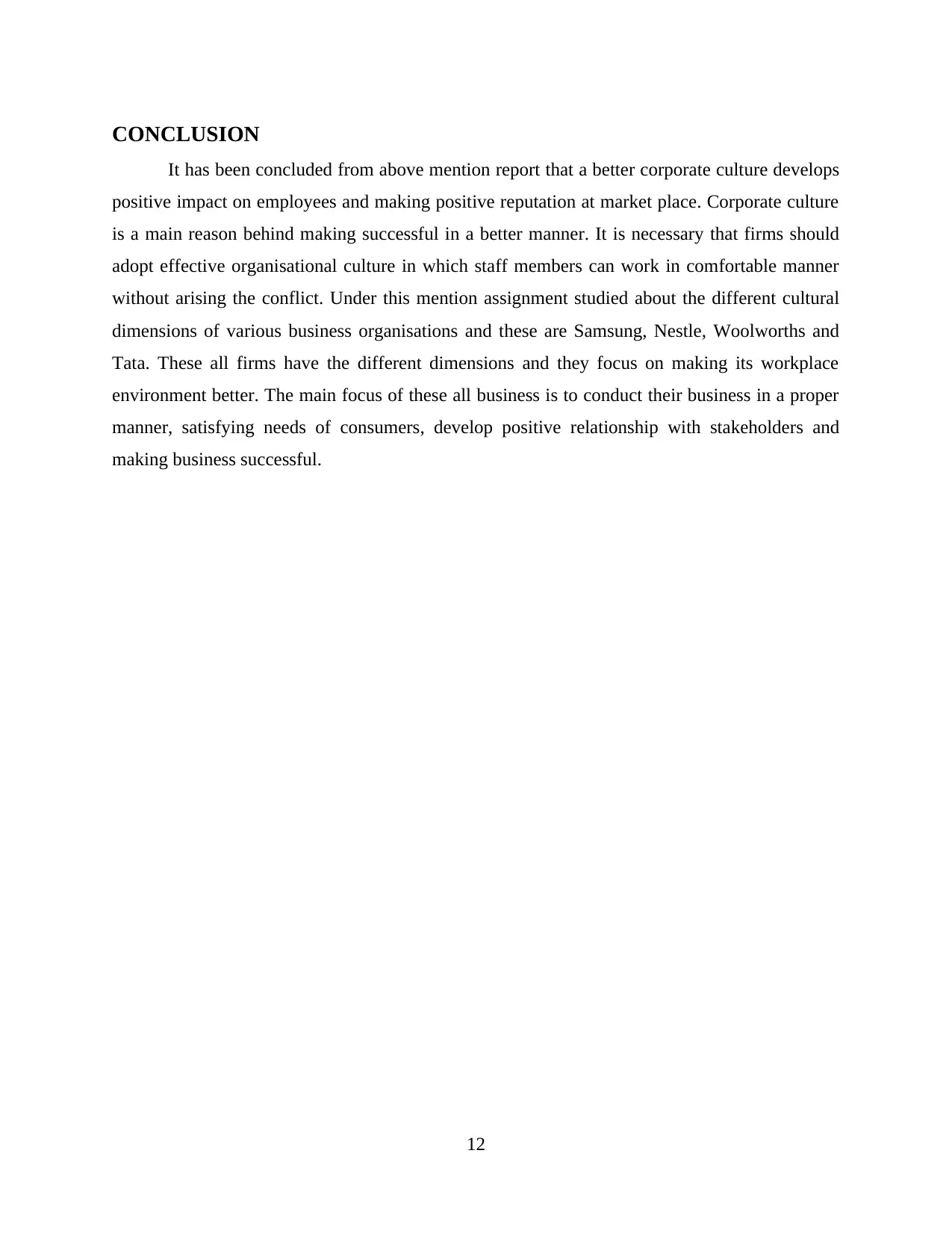
CONCLUSION
It has been concluded from above mention report that a better corporate culture develops
positive impact on employees and making positive reputation at market place. Corporate culture
is a main reason behind making successful in a better manner. It is necessary that firms should
adopt effective organisational culture in which staff members can work in comfortable manner
without arising the conflict. Under this mention assignment studied about the different cultural
dimensions of various business organisations and these are Samsung, Nestle, Woolworths and
Tata. These all firms have the different dimensions and they focus on making its workplace
environment better. The main focus of these all business is to conduct their business in a proper
manner, satisfying needs of consumers, develop positive relationship with stakeholders and
making business successful.
12
It has been concluded from above mention report that a better corporate culture develops
positive impact on employees and making positive reputation at market place. Corporate culture
is a main reason behind making successful in a better manner. It is necessary that firms should
adopt effective organisational culture in which staff members can work in comfortable manner
without arising the conflict. Under this mention assignment studied about the different cultural
dimensions of various business organisations and these are Samsung, Nestle, Woolworths and
Tata. These all firms have the different dimensions and they focus on making its workplace
environment better. The main focus of these all business is to conduct their business in a proper
manner, satisfying needs of consumers, develop positive relationship with stakeholders and
making business successful.
12
⊘ This is a preview!⊘
Do you want full access?
Subscribe today to unlock all pages.

Trusted by 1+ million students worldwide
1 out of 15
Related Documents
Your All-in-One AI-Powered Toolkit for Academic Success.
+13062052269
info@desklib.com
Available 24*7 on WhatsApp / Email
![[object Object]](/_next/static/media/star-bottom.7253800d.svg)
Unlock your academic potential
Copyright © 2020–2026 A2Z Services. All Rights Reserved. Developed and managed by ZUCOL.





